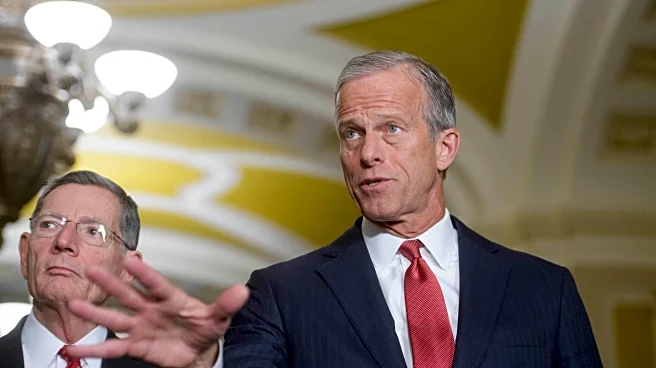What's Happening?
Egypt and Turkey have raised concerns regarding the language used in a draft United Nations resolution aimed at disarming Hamas in Gaza. The resolution, which is being developed by the United States, proposes
the deployment of an international force to demilitarize the Gaza Strip, including the destruction of military infrastructure. Egyptian officials have expressed a preference for negotiating a handover of heavy weapons with Hamas rather than confronting the group directly. They emphasize the importance of offering amnesty to Hamas fighters who surrender their weapons. Turkish officials are wary of the resolution's approach, which they believe outsources Israeli security to Arab and Muslim troops, treating the stabilization force more like a domestic security agency than peacekeepers. Both countries have not been consulted by U.S. officials on the resolution's details, leading to concerns about the force's perceived legitimacy among Palestinians.
Why It's Important?
The concerns raised by Egypt and Turkey highlight the complexities involved in international efforts to stabilize Gaza. The resolution's language and approach could impact regional dynamics, as Arab and Muslim states are cautious about being perceived as enforcers of Israeli security interests. The situation underscores the delicate balance required in international diplomacy, where the legitimacy and acceptance of peacekeeping forces are crucial for their success. The involvement of President Trump and the U.S. in drafting the resolution also reflects broader geopolitical interests and the challenges of aligning these with local and regional priorities. The outcome of these negotiations could influence future peace efforts and the role of international forces in conflict zones.
What's Next?
The draft resolution is part of President Trump's 20-point peace plan for Gaza, which includes the deployment of an international stabilization force. The resolution's progress will depend on further negotiations and consultations with key stakeholders, including Egypt and Turkey. The U.S. may need to address the concerns of these countries to ensure the resolution's acceptance and effectiveness. The international community will be watching closely to see how these diplomatic efforts unfold and whether they can lead to a sustainable peace in Gaza. The resolution's implementation could set a precedent for future international interventions in similar conflicts.
Beyond the Headlines
The involvement of the UN in the resolution, despite the Trump administration's previous hostility towards the organization, marks a significant shift in U.S. policy. This pivot could be seen as a victory for Arab and Muslim states, who prefer a UN-backed initiative to avoid being perceived as occupiers on behalf of Israel. The resolution's success will depend on its ability to balance international oversight with local acceptance, ensuring that the stabilization force is seen as legitimate by Palestinians.











